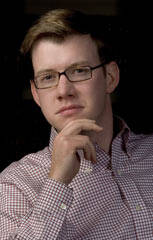I don’t like the sound of my own voice. Or at least I didn’t until I was forced to listen to it over and over again. Let me explain.
When I was hired at America, I was asked to investigate ways to expand the magazine’s presence online. At the time, our Web site had no content beyond what was in the print edition. An online editor at another publication suggested we try conducting audio interviews: the hardware is inexpensive, and with the advent of the iPod, digital files are a cinch to circulate.
Three years and 100 podcasts later, the experiment has proved to be a modest success. With the aid of two microphones and a soundboard, we have recorded conversations with dozens of writers and friends of the magazine. In the case of America’s editors, it is easy to convince them to swing by my office for a conversation. Just last week, Father Tom Massaro sat down to discuss Michael Sandel’s new PBS series based on Sandel’s Harvard course, “Justice.” Our convenient location in midtown Manhattan has also helped. Amy Uelmen of Fordham University was happy to make the walk from her Lincoln Center office to discuss Pope Benedict XVI’s “Caritas in Veritate” with Kerry Weber.
Sometimes I worry that we will run out of people to talk to. Already I have interviewed Ron Hansen, Robert Ellsberg, Therese Borchard, David Gibson, Donna Freitas, Paul Moses and Camille D’Arienzo, R.S.M. Surely, I thought, the pool of Catholic writers and thinkers runs only so deep. Even if I decide to conduct more phone interviews, which I am reluctant to do for reasons of sound quality, I will eventually exhaust the Rolodex of even my most media-savvy colleagues.
Yet I have been pleasantly surprised by the number and variety of voices available to us—a sign of the vitality of Catholic culture today. Between new books and television shows, political debates and papal encyclicals, there has been no shortage of topics for us to consider. None of this will come as news to any avid reader of Catholic publications, but for me it has been a source of consolation.
Today’s Catholic milieu may not be quite as thick as it was in the heady days after the Second Vatican Council, but reports of its demise have been greatly exaggerated. A new generation of Catholic writers and scholars is actively engaging the culture in many interesting ways. Consider Maureen O’Connell’s study of Philadelphia’s Mural Arts Program or Robert Sullivan’s re-examination of the founding father of environmentalism in The Thoreau You Don’t Know. Both individuals, by the way, have been guests on our podcast.
None of this is to say that our weekly interviews have caught the attention of NPR. Our podcasts sometimes generate only a modest number of hits, and young people, in particular, do not seem drawn to 20-minute interviews. Surprisingly, the format may be most attractive to our longtime readers, who enjoy hearing the voices of writers they had previously known only by their byline.
Which brings me back to the sound of my own voice. When I began editing the podcasts, I would listen in agony as I made my way through an interview. Do I really say “um” that much? Do I have to preface every question with “Now...”? Yet over time I grew accustomed to the stranger’s voice and learned not to shy from playing with its pitch and tone when the microphone was on.
Of course the podcast would be incomplete without our gracious guests, and our discussions would be futile without our listeners in the ether. So if you have not already done so, tune in to the conversation. You can hear my dulcet tones at americamagazine.org/podcast.








Thank you for the Podcasts. I look forward to them. It is good to sit back and listen to a favorite author, get acquainted with a newpersonality or just plainly enjoy it all.
Do not forget that these podcasts can easily be downloaded, burnt to a CD and passed on to a person with limited physical vision. In addtion, they make for great listenin on a long drive.
The more the better.
Thanks.
Thanks for your hard work.